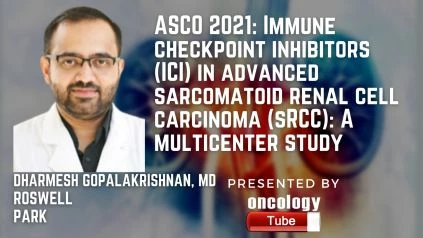Dharmesh Gopalakrishnan, MD, a Hematology-Oncology Fellow at Roswell Park speaks about the ASCO 2021 Abstract – Immune checkpoint inhibitors (ICI) in advanced sarcomatoid renal cell carcinoma (sRCC): A multicenter study.
Link to Abstract:
https://meetinglibrary.asco.org/record/197617/abstract
Backstory:
Advanced sRCC is a dangerous cancer that responds poorly to chemotherapy and VEGF-targeted treatments. Even though the sample sizes were modest, subgroup analysis from randomized trials revealed that ICI improved outcomes.
Methodologies:
A multi-institutional retrospective investigation of consecutive patients (pts) with RCC and any sarcomatoid component who underwent systemic treatment for advanced illness was undertaken. The patients were divided into two groups (gp) based on whether or not they had received ICI in any of the treatment lines. The time from the start of the first systemic medication to the end of the study was used to calculate overall survival (OS). The period from the start of ICI to further therapy or death was referred to as the time to ICI failure (TIF). The Kaplan-Meier technique was used to calculate survival distributions. Multivariate Cox regression was used to investigate the relationship between variables and survival. P0.05 with two tailed significance was judged statistically significant.
Outcomes:
203 patients from six university cancer institutions in the United States fulfilled the inclusion criteria, with 155 in the ICI+ gp group and 48 in the ICI- gp group. Overall, 137 (67%) men and 181 (89%) women were diagnosed with mRCC; the median age at diagnosis was 59.7 (IQR 52.4-67.7) years; 129 (63%) patients presented de novo with distant metastases, 154 (76%) had clear cell (CC) histology, and 182 (90%) had intermediate/poor risk by IMDC criteria. Other demographic and clinical aspects were comparable between the two gps. ICI+ had a larger number of exclusively CC tumors (81 percent vs 64 percent, P =.02); other demographic and clinical features were similar between the two gps. The ICI+ gp had substantially higher median OS and response rates at a median follow-up of 48.1 (95 percent CI 40.7-55.5) months (mos) (Table). In patients who got ICI in the second line, the OS advantage was sustained (39.6 vs 7.6 mos, HR 0.33, 95 percent CI 0.22-0.51, log-rank P.001). TIF was similar in patients who received ICI upfront vs. those who received it later (6.0 vs. 5.3 months, HR 1.27, 95 percent CI 0.87-1.85, P =.21). ICI- (HR 2.50, 95 percent CI 1.61-3.88, P.001), non-CC histology (HR 3.14, 95 percent CI 1.98-5.00, P.001), and sarcomatoid component 20% (HR 1.92, 95 percent CI 1.28-2.90, P =.002) were all predictive of all-cause death on multivariate analysis. ICI+ showed a higher OS (18.0 vs 5.5 mos, HR 0.20, 95 percent CI 0.09-0.44, P.001) and ORR (44 percent vs 12 percent, P =.03) than ICI- in non-CC or mixed histology patients (n=45).
Summary of findings:
In advanced sRCC, ICI treatment resulted in significantly better survival and response rates. In the second line and beyond, the OS advantage was preserved using ICI. Patients with non-CC or mixed histology sRCC benefited significantly as well.

